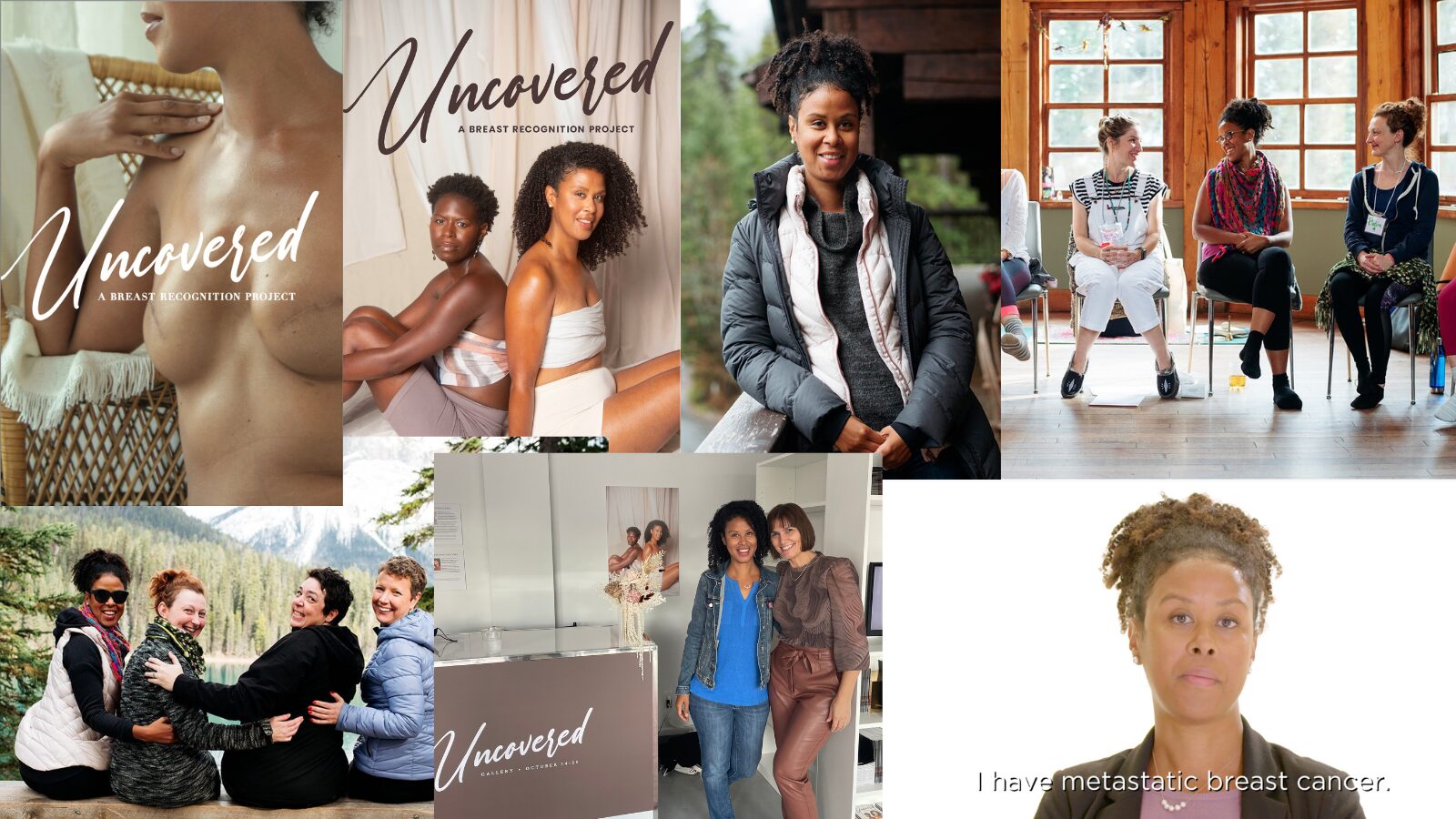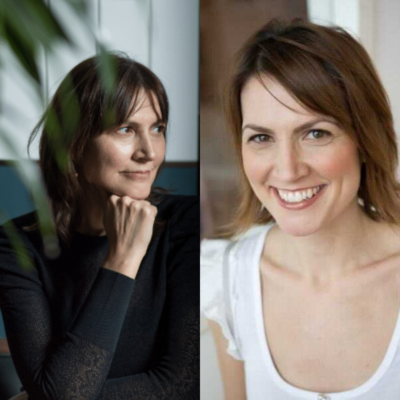20 Years of Rethink: Michelle’s Impact
9 MINS to read
9 MINS to read

I officially met Michelle Audoin on “Giving Tuesday” of 2019. An appropriate day for us to meet, even though I had no idea then that she would end up giving so much to Rethink or that one of her gifts would be to inspire another important step in Rethink’s ongoing evolution (that of leaning into health equity and system change through the lenses of social justice and sustainability).
I was heading into a pretty stressful Board meeting, while also trying to be festive because it was the last meeting before the holidays (we had charcuterie and treats) and the rest of the team was simultaneously hosting a celebratory Giving Tuesday Give-A-Thon upstairs. Michelle was dropping something off and had just checked in at the front desk of our building as I brushed around the corner. We had a chance for a quick, “oh hey, good to meet you” hello in the hallway adjacent to the foyer.
Despite my distraction about the Board meeting, I was keen to meet her. Michelle had recently been featured in a beautiful and powerful advocacy video we created to help recruit people to be one of our 10,000 MBC Allies. We had just witnessed the effectiveness of many (many!) voices making the same “ask” and we wanted to keep those who had signed our petition to improve the transparency and timelines for decisions about breast cancer treatments engaged. There was a lot more work to be done. We needed them and we needed more.
One of the best ways to compel people to want to change the system is by humanizing the issue. All three women featured in our video had truly compelling stories about living with MBC and were brave enough to tell their story on camera and ask “will you be my ally?” I knew the other two women a little bit, but I wasn’t at the video shoot and while I had heard lots about Michelle from the team and been brought to tears by her words in our video, I had never met her. But for a couple weeks we’d been having email correspondence about several things—ranging from her friend’s daughter who was fundraising for us and wanted to ensure the funds went to MBC initiatives, to her interest in our MBC Advisory Board, to some challenges she had around treatment options and decision making. Michelle was two years into her MBC diagnosis and shared her frustration about what treatments she could and could not access. She had some bad luck and complicated aspects to her diagnosis that impacted treatment options and was looking for some insights. Michelle closed her email with “in spite of my frustration, I also have an idea for a project that I wonder if Rethink could help bring to light.”
That idea was what would become Uncovered: A Breast Recognition Project.
Michelle and I met again mid-December at our holiday open house for the community. It was a fun, mix and mingle in a boardroom in the cool shared workspace where our little Rethink HQ are housed. Strange to think of us all crowded into such a space now. But we had music and refreshments and gift bags and lots of lovely chatting. Michelle and I visited a bit and touched on “the idea,” but it wasn’t the right time or place to actually discuss it. She said we’d talk again in the future.
That was December 2019 and we next spoke about the idea in summer of 2020. Like many organizations, we’d been digesting all that had transpired in 2020. To put it succinctly, we were devastated, but also inspired by the massive Black Lives Matter movement following the murder of George Floyd. It led us to feeling more compelled to be a part of the equity and justice movements taking place. To do more, and do better. It started with Rethink putting out a post on Instagram declaring our intentions to truly listen to what was occurring and also our desire to better support health equity in the breast cancer space and help address systemic racism in our healthcare system.
I look back at that post now after 18 months of learning and unlearning and I somewhat cringe at a few things I would say differently. But that post did create a jumping off point for Michelle to respond. She quickly reached out.
I got on a Zoom with Michelle and Tania from our team and Michelle shared her experience as a young, Black woman with breast cancer being treated at a renowned cancer centre in Canada’s largest, most diverse city. She felt invisible and deflated throughout her diagnosis and treatment journey, often feeling unheard by her healthcare team and unseen amongst the after-surgery imagery shown.
Michelle also shared some of her experiences with Rethink, an organization she loved. She was honest the way a friend is when they need to get real with you because they care about you. She said she loved participating in our transformative Stretch Heal Grow yoga and wellness retreat in Emerald Lake B.C. and cherished the friends she made there. But she recalled that when she got off the bus to the mountain resort, she looked around and didn’t see many other women that looked like her – just one other Black woman, Caroline. She told us “I know there’s more of us out there that would love this retreat. That would benefit from it.”
We talked a bit about some of the barriers and ways to help address them. We also talked about the MBC Advisory Board and how the application process could be more inclusive and inviting. And we talked a little bit about her idea for a project that would showcase Black women living with and affected by breast cancer. Michelle wanted to shine a spotlight on their stories—the physical and emotional scars and identity as it relates to Black bodies. She wanted the resource to be shared with cancer care teams so that they are better equipped to support all the people they care for.
There was no need for a separate internal meeting for us to discuss the opportunity. Michelle was serious and steady in the call and well-prepared for the conversation. It was clear she’d done a lot of reflecting on her experiences and these issues and that she’d been thinking about the project and honing her vision for a long time. We did our best to create a safe space in the Zoom meeting for her to be heard and feel comfortable. We immediately said we’d love to collaborate. We’d love to be a part of bringing her vision to life. We’d love to be a part of its impact. It wasn’t lost on us that Michelle had just brought us into a project that gave us an opportunity to immediately act on the aspirations we outlined in that Instagram post.
We hung up from the Zoom. My then 16-year-old—an only child with the kind of big ears that can hear adults whispering from two floors up—was nearby doing schoolwork. She looked at me and said, “That was intense but that was so good, mom.” I knew what she meant. That it was so good for Rethink to hear so honestly from Michelle.
That meeting was a major turning point for me and for Rethink and I’m forever grateful for Michelle’s help in moving us forward.
I feel like the Michelle I know today has also moved forward. She sometimes seems like a different person than the one I met two years ago. We’ve gotten to know each other through tag teaming on media blitzes for Uncovered (we bond over a few quirks we share in how we like to prep for interviews) and working on other MBC campaigns. I see Michelle almost every other week on our MBC Advisory Board meetings. And we have a good Messenger thread going. In with all the work chat there is life chat too. It’s often about kids, but other stuff too—art, fashion, food, politics. We laugh. I know she has heavy, difficult days from the undeniable burden that is MBC, but I feel like I’ve had the privilege of seeing her lighten and heal from some of the hurt of feeling invisible as a Black woman in cancer care. She’s a truly beautiful person.
Michelle and Caroline, who she met at the Stretch Heal Grow retreat, are the co-chairs of Rethink’s Equity, Diversity and Inclusion working group. Together with Jasmine on our team, they’re leading and driving our use of a stronger health equity lens for all our work.
The issues of our time intersect. Breast cancer and prevention is connected to social justice, economic equity, and environmental justice. One cannot be addressed without the other. And these are all core components of sustainability. This means we cannot do our best work in rethinking breast cancer without addressing intersectionality. And without keeping sustainability as the grounding place from where we achieve our best work.
Michelle embodies the intersectionality of the gaps that 20 years later Rethink is focused on addressing. She’s a young woman with breast cancer. She’s a young woman with metastatic breast cancer. She’s a young, Black woman with metastatic breast cancer.
Michelle, you continue to be such a gift to Rethink. Thank you for your collaboration. Thank you for your trust. Thank you for your friendship. Thank you for inspiring us to keep moving forward. Forever, Forward.
MJ DeCoteau, Founder + Executive Director of Rethink Breast Cancer. At 22, after losing her mother to metastatic breast cancer, MJ was hard-pressed to find relevant information that was not scary and overwhelming about her own risk factors. She quickly realized that young people were in the dark about breast cancer simply because they weren’t being targeted by awareness campaigns and other efforts.
By 2001, she brought together a group of innovative, energetic, and creative minds to found Rethink Breast Cancer, putting young people concerned about and affected by the disease in the spotlight for the very first time. Today, MJ leads Rethink’s small but dynamic team of staff and volunteers dedicated to creating resources, campaigns, events, research, and advocacy initiatives that help young people live better and live longer.
